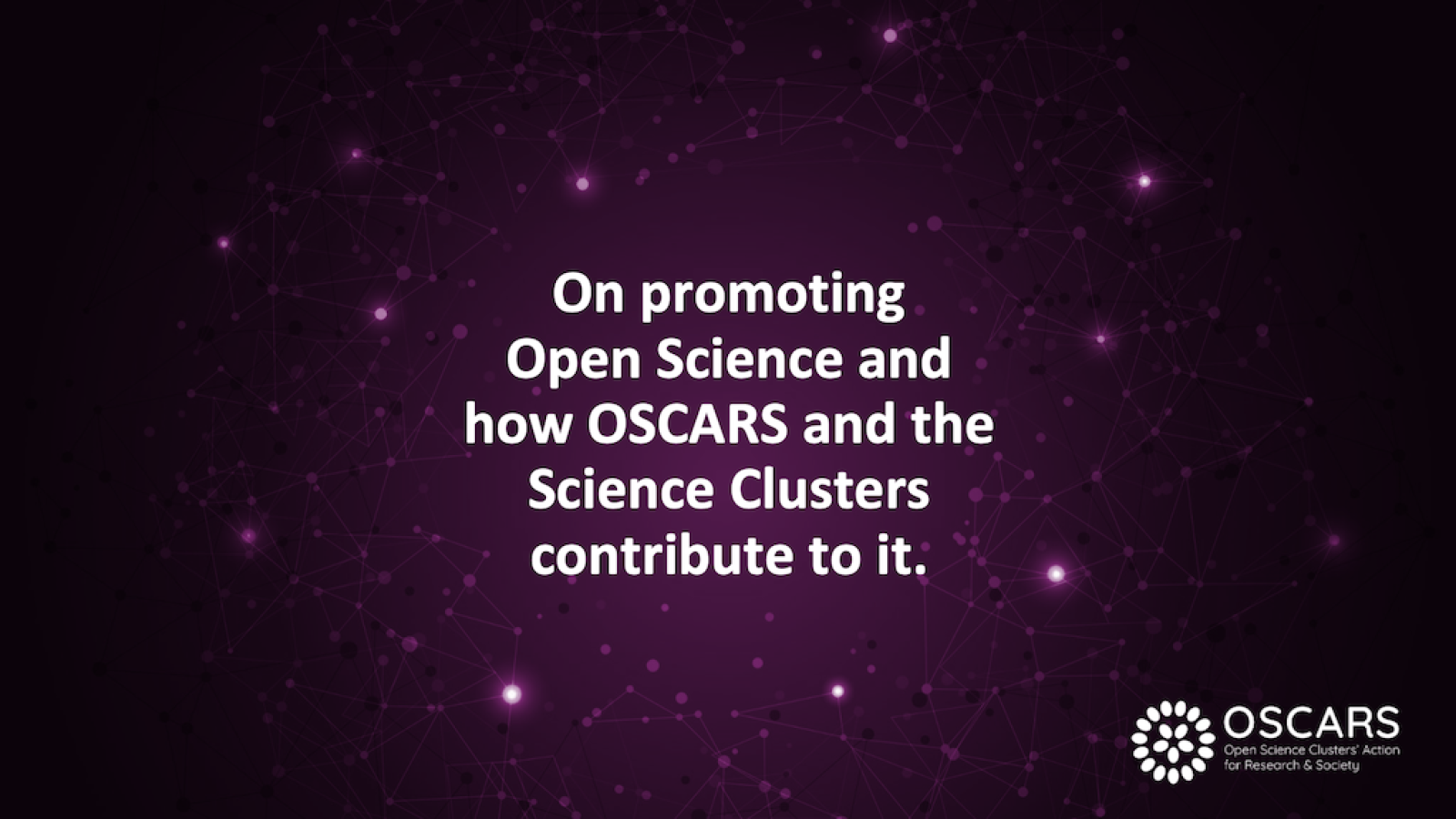
This short article is one in a series addressing the impact of the OSCARS project on Open Science practices in Europe. (Reading suggestion: start with the introduction to the series).
Read the article on Zenodo
There is a growing understanding that Open Science supports not only research excellence but also innovation, public trust, and global competitiveness.
In fact, Open Science represents a transformative shift in the way research is conducted, shared, and assessed. By enabling the FAIRness of research outputs – such as (meta)data, publications, and software – it improves transparency, quality, and collaboration across disciplines. It promotes a more collaborative and inclusive research ecosystem, breaking down silos between disciplines and institutions and supporting a broader range of actors – including researchers, citizens, policymakers and industry – to engage with and contribute to science. The promotion of Open Science is therefore not just a technical objective for better common understanding, but also a cultural and structural change that aims to deeply transform human practices and respond to global challenges. It demands new incentives, infrastructures, and governance models in a strong and shared, community-approved policy framework. The Strategic Research and Innovation Agenda - SRIA of the European Open Science Cloud (EOSC) outlines how Europe can lead this transformation.
A central focus of the SRIA is to encourage Open Science by recognising and rewarding researchers for their engagement in efficient Open Science practices. This includes the adoption of FAIR principles for research outputs, as well as the integration of Open Science contributions into career evaluation systems. The SRIA also stresses the need to build capacity among researchers through training and education, so that they are equipped to manage data with quality objectives, understand and disseminate FAIR principles, and effectively contribute to the EOSC ecosystem building.
The SRIA priorities for 2025–2027 include ensuring the long-term sustainability of the federated infrastructure, enhancing the integration of AI and automated FAIR-enrichment tools for (meta)data, safeguarding the security and sovereignty of research data, and connecting EOSC more deeply with other specific data spaces.
Ultimately, the promotion of Open Science is about making FAIR practices a default in research, supported by robust and well designed technical systems, FAIR assessment mechanisms and sustained, well tailored support and assistance, and inclusive governance, creating a research ecosystem where knowledge is accessible and benefits society.
How have the five Science Clusters contributed to promoting Open Science?
The five Science Clusters – ENVRI, ESCAPE, PaNOSC, LS‑RI, and SSHOC – in the frame of OSCARS, have started to set up Community-based Competence Centres (CCCs), i.e. cluster-specific virtual hubs dedicated to fostering research excellence through training and knowledge transfer. CCCs are supported by a collaborative network of people rooted in the Science Clusters. They aim to provide expertise, best practices, and services in relation to Open Science, and promote the FAIR principles and cross-disciplinary collaboration.
By building frameworks and support mechanisms, CCCs are envisaged to ensure these practices become widespread and deeply embedded in scientific research processes. They should also be a key tool to help address the critical challenge of promoting interoperability across RIs and domains.
Below is an overview of how each of the SCs has contributed to further promoting Open Science.
ENVRI (Environmental Sciences)
The ENVRI Science Cluster has established a dedicated CCC integrated within the ENVRI‑Hub, providing tailored expertise, metadata guidance, and interoperability tools to support environmental scientists in implementing FAIR‑aligned data services. It fosters collaboration and sustainable data ecosystems by enabling community-driven training and joint problem-solving across environmental research infrastructures (RIs).
Contact the ENVRI CCC: competence-centre@envri.eu
ESCAPE (Astrophysics, Nuclear & Particle Physics)
The ESCAPE Science Cluster’s activity directly tackles Open Science challenges by developing a prototype Data Lake and Science Platform, supporting an Open Source Software Repository, integrating Virtual Observatory frameworks into EOSC, enabling public access, FAIR publishing of data/software, and engaging the wider research community via citizen science and open-source analysis tools. As all the other SCs, also ESCAPE set up its CCC in the frame of OSCARS. It is currently in its development stage, though already responding to the queries coming from the research community.
Contact the ESCAPE CCC: competence.centre@projectescape.eu
LS-RI (Life Sciences)
To better engage with the research community, the LS-RI Science Cluster has delivered FAIR data resources from life science RIs via open hackathons and "bring‑your‑own‑data" events, enabling practical co‑creation of harmonised and reusable (data) workflows within EOSC. With respect to the cluster-specific CCC, one for LS-RI has been set up in the frame of OSCARS. Taking into consideration the current operational status of LS-RIs, two broad implementation scenarios for further development have emerged: a federated CCC network, and an LS-RI centralised CCC entity. It is likely that the most effective approach will combine elements from both. A mixed operational model, specifically, a network of CCC spokes federated through a jointly-coordinated central hub (hub-and-spoke model), combining the strengths of both centralised and federated approaches.
Contact the LS-RI CCC: competence.centre@eatris.eu
PaNOSC (Photon and Neutron Science)
The PaNOSC Science Cluster has launched flagship Open Science projects, such as the Human Organ Atlas, which publishes high-value photon/neutron data and metadata through an open-access portal. It also participated in cross‑cluster EOSC symposia to advance shared standards, training modules, and disciplinary convergence in open tools and workflows. In the frame of OSCARS, PaNOSC set up its CCC, which has already started operating. It is also engaging with the projects funded via the OSCARS 1st Open Call to discuss common challenges and needs.
Contact the PaNOSC CCC: competence.centre@panosc.eu
SSHOC (Social Sciences & Humanities)
The SSH Open Science Cluster (SSHOC) contributes to promoting Open Science via cross‑disciplinary use cases and collaboration. An example is the Climate‑Neutral and Smart Cities project (with ENVRI), blending environmental and social datasets in an open prototype. Cross-disciplinary collaboration is taking shape in multiple projects combining cultural heritage data with other humanities data types, such as text and oral history. d SSHOC initiated the development of the SSH Open Marketplace for the discovery of data and tools, reproducible workflows and training materials. In the frame of OSCARS, SSHOC set up its Competence Centre, which is currently under development to respond to the needs of the research community.
Contact the SSHOC CCC: sshoc@oscars-project.eu
OSCARS funded projects contributing to promoting Open Science.
Below is an overview of the projects working to make improvements primarily in this area:

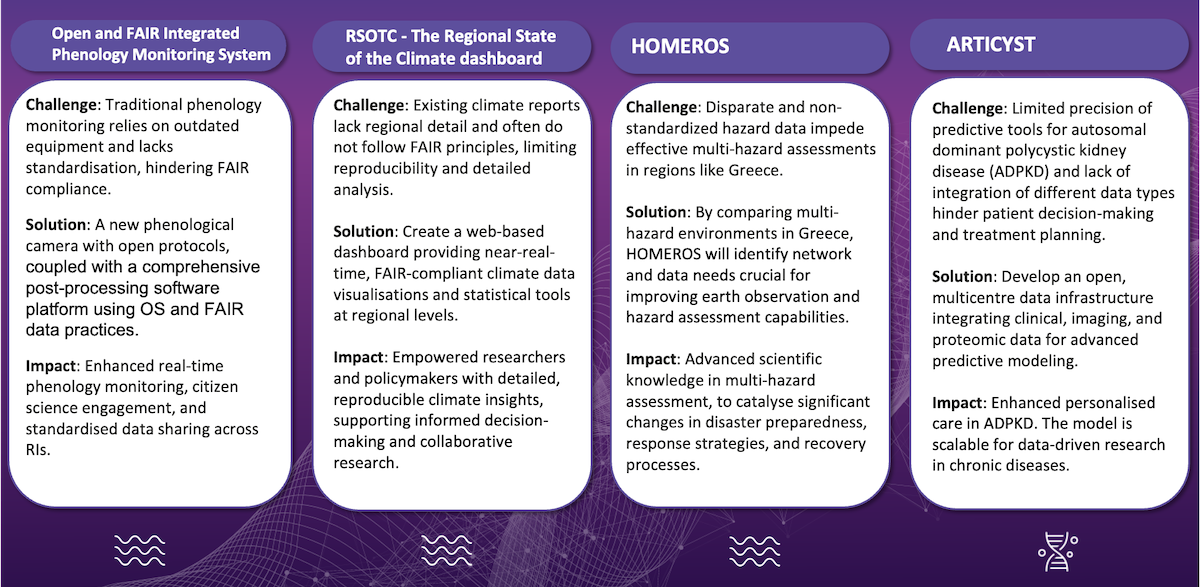
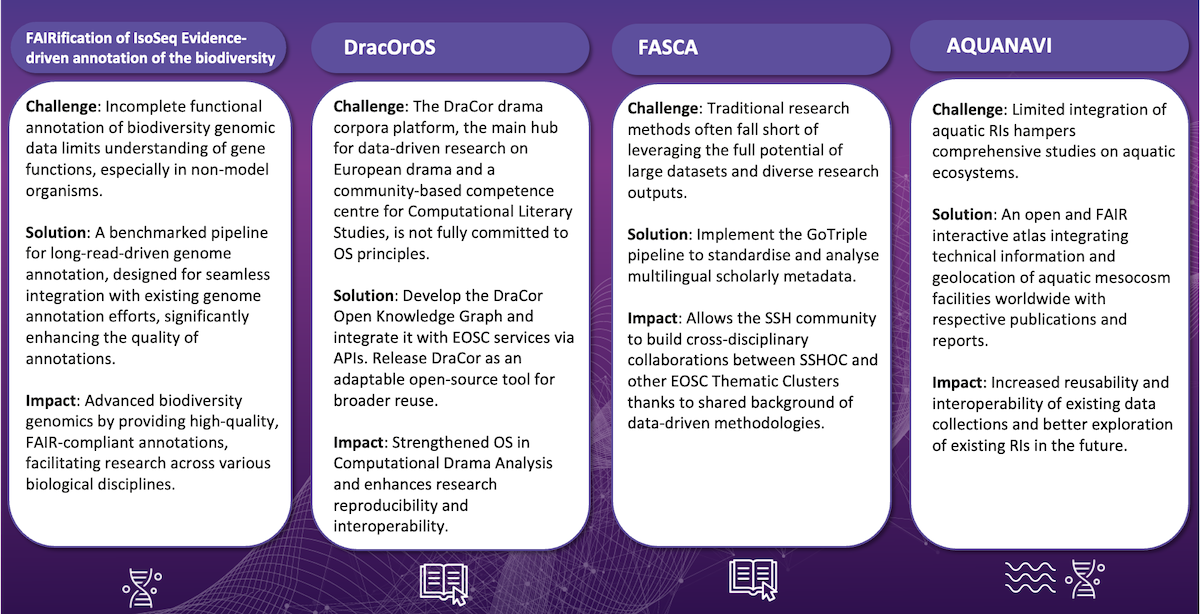
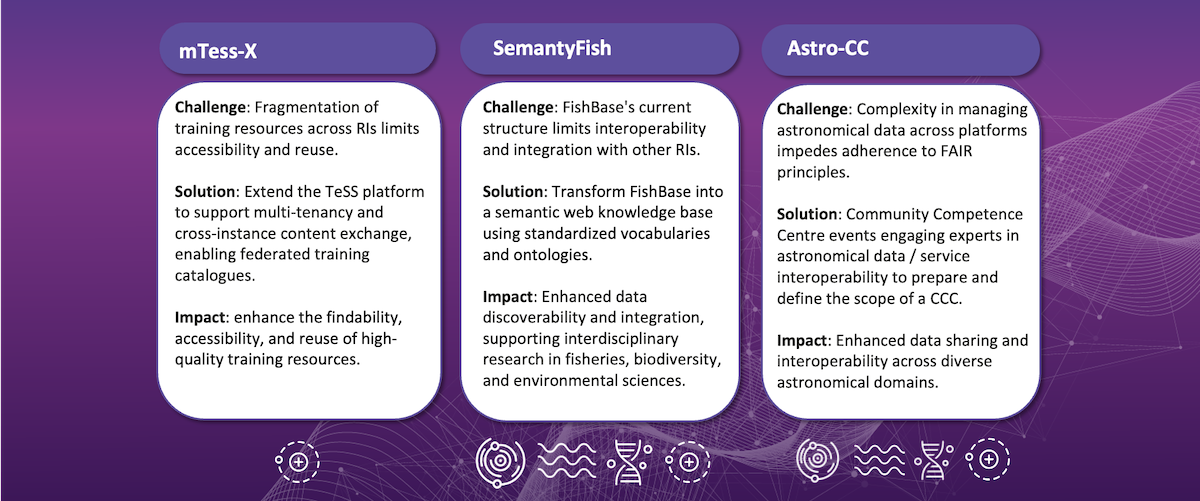
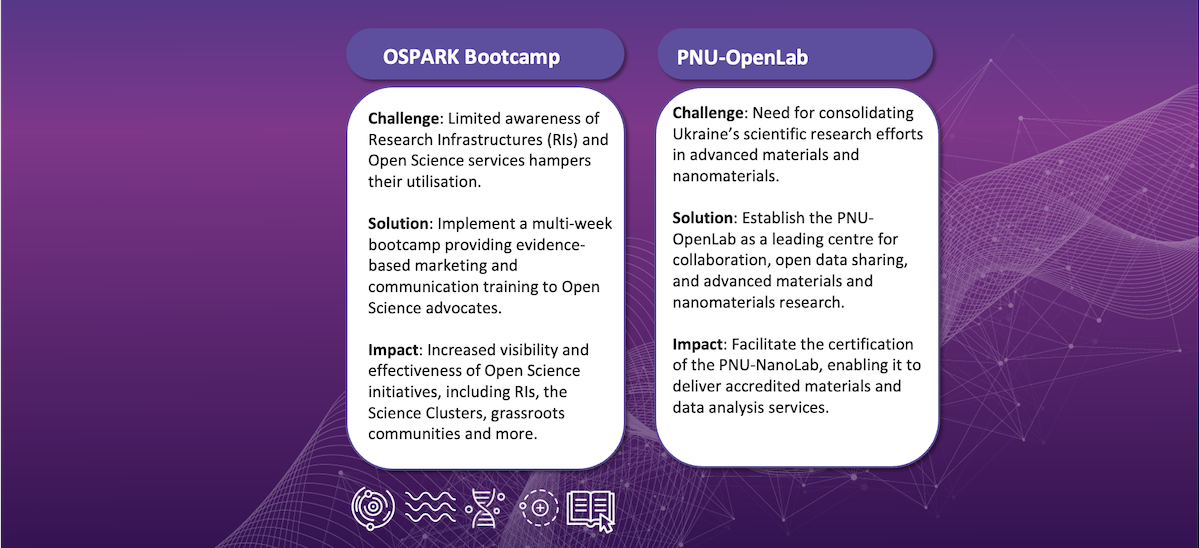
Browse all OSCARS funded projects here
Useful resources:
European Open Science Cloud (EOSC) official portal
EOSC Strategic Research and Innovation Agenda (SRIA 1.3, 2024)
OpenAIRE – Open Science infrastructure in Europe
LIBER – European Research Libraries Open Science resources
SPARC Europe – Advocacy for Open Access and Open Science
Science Europe – Position papers and guidelines on Open Science
Authors
Nicoletta Carboni (CERIC-ERIC), Romain David (ERINHA), Franciska de Jong (Utrecht University), Jonathan Ewbank (ERINHA), Darja Fišer (CLARIN ERIC), Justine Thomas (CNRS-LAPP), Friederike Schmidt-Tremmel (Trust-IT).
DOI
http://doi.org/10.5281/zenodo.17225854